Supporting Underachieving Students: Mentoring Skills and Strategies
VerifiedAdded on 2020/03/04
|11
|4159
|84
Essay
AI Summary
This essay delves into the critical role of mentoring in supporting underachieving students, particularly within clinical practice. It addresses the challenges mentors face, such as student disinterest and ensuring the effective application of learned knowledge. The essay emphasizes the importance of aligning teaching techniques with learner abilities and understanding the factors that affect underachieving students' learning processes, citing Natale's (1995) estimate of 40%-60% underperformance. It outlines the role of the mentor according to NMC standards, including setting objectives, identifying strengths and weaknesses, and promoting reflection. The essay discusses assessment processes, the importance of interpersonal support, and the need for mentors to foster reflective communication and critical thinking. It highlights characteristics of underachieving students, such as low self-esteem, poor academic skills, family dynamics, and attention deficits. Furthermore, the essay explores various learning styles and applications of learning theories, including pedagogy, to guide mentors in creating effective learning environments. The essay also considers how mentors can help students overcome issues and provides practical advice for mentors to use in practice.
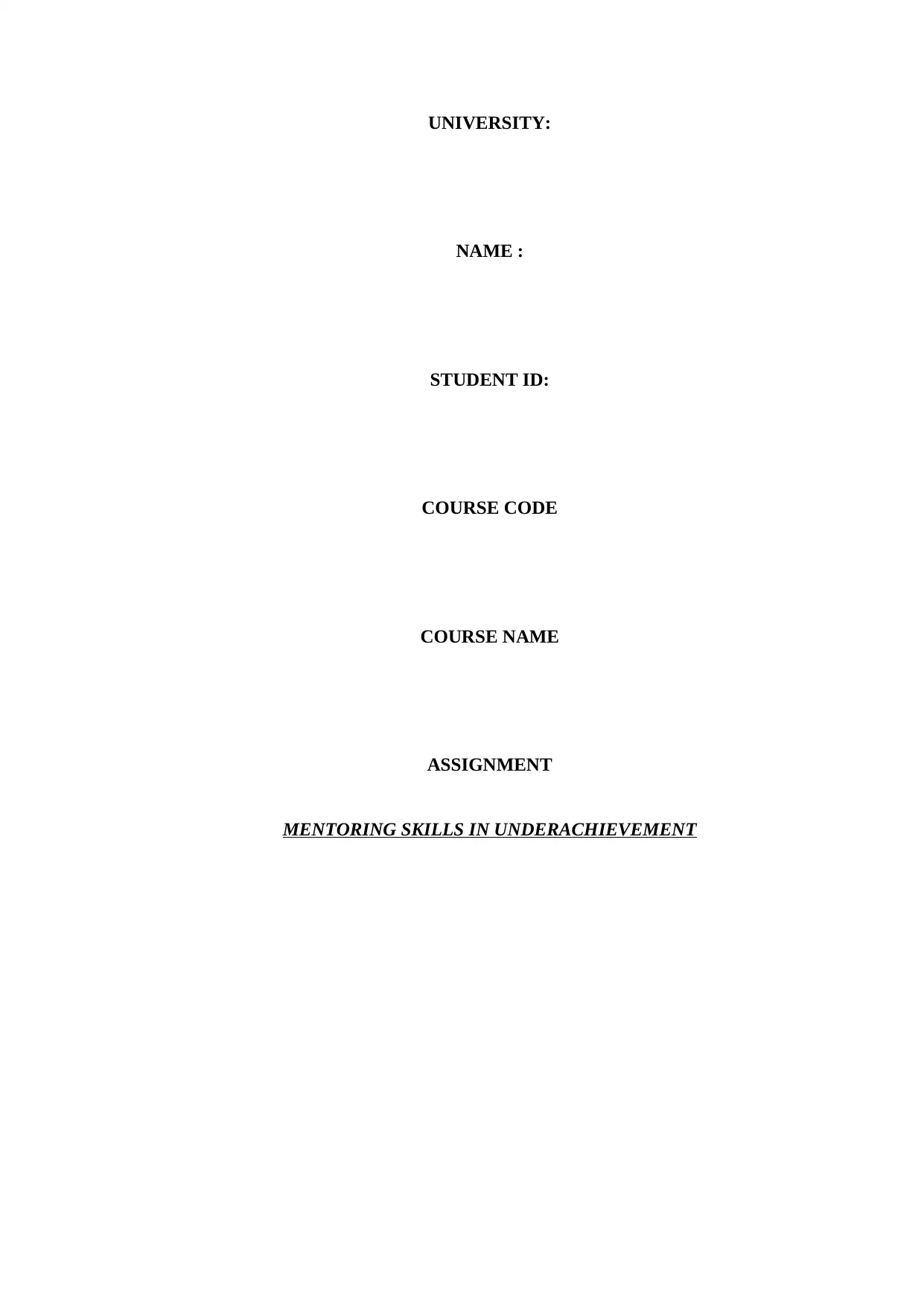
UNIVERSITY:
NAME :
STUDENT ID:
COURSE CODE
COURSE NAME
ASSIGNMENT
MENTORING SKILLS IN UNDERACHIEVEMENT
NAME :
STUDENT ID:
COURSE CODE
COURSE NAME
ASSIGNMENT
MENTORING SKILLS IN UNDERACHIEVEMENT
Paraphrase This Document
Need a fresh take? Get an instant paraphrase of this document with our AI Paraphraser
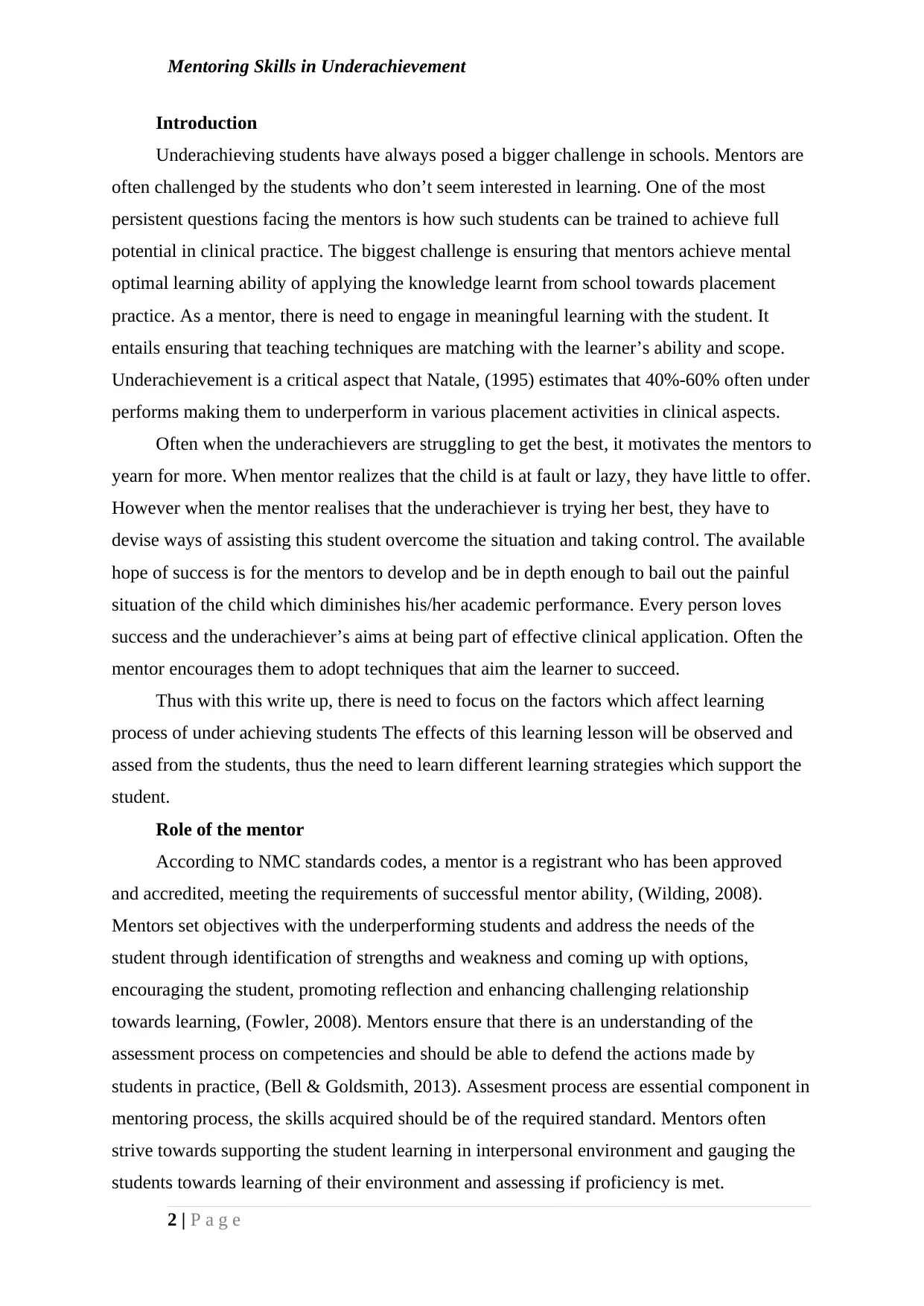
Mentoring Skills in Underachievement
Introduction
Underachieving students have always posed a bigger challenge in schools. Mentors are
often challenged by the students who don’t seem interested in learning. One of the most
persistent questions facing the mentors is how such students can be trained to achieve full
potential in clinical practice. The biggest challenge is ensuring that mentors achieve mental
optimal learning ability of applying the knowledge learnt from school towards placement
practice. As a mentor, there is need to engage in meaningful learning with the student. It
entails ensuring that teaching techniques are matching with the learner’s ability and scope.
Underachievement is a critical aspect that Natale, (1995) estimates that 40%-60% often under
performs making them to underperform in various placement activities in clinical aspects.
Often when the underachievers are struggling to get the best, it motivates the mentors to
yearn for more. When mentor realizes that the child is at fault or lazy, they have little to offer.
However when the mentor realises that the underachiever is trying her best, they have to
devise ways of assisting this student overcome the situation and taking control. The available
hope of success is for the mentors to develop and be in depth enough to bail out the painful
situation of the child which diminishes his/her academic performance. Every person loves
success and the underachiever’s aims at being part of effective clinical application. Often the
mentor encourages them to adopt techniques that aim the learner to succeed.
Thus with this write up, there is need to focus on the factors which affect learning
process of under achieving students The effects of this learning lesson will be observed and
assed from the students, thus the need to learn different learning strategies which support the
student.
Role of the mentor
According to NMC standards codes, a mentor is a registrant who has been approved
and accredited, meeting the requirements of successful mentor ability, (Wilding, 2008).
Mentors set objectives with the underperforming students and address the needs of the
student through identification of strengths and weakness and coming up with options,
encouraging the student, promoting reflection and enhancing challenging relationship
towards learning, (Fowler, 2008). Mentors ensure that there is an understanding of the
assessment process on competencies and should be able to defend the actions made by
students in practice, (Bell & Goldsmith, 2013). Assesment process are essential component in
mentoring process, the skills acquired should be of the required standard. Mentors often
strive towards supporting the student learning in interpersonal environment and gauging the
students towards learning of their environment and assessing if proficiency is met.
2 | P a g e
Introduction
Underachieving students have always posed a bigger challenge in schools. Mentors are
often challenged by the students who don’t seem interested in learning. One of the most
persistent questions facing the mentors is how such students can be trained to achieve full
potential in clinical practice. The biggest challenge is ensuring that mentors achieve mental
optimal learning ability of applying the knowledge learnt from school towards placement
practice. As a mentor, there is need to engage in meaningful learning with the student. It
entails ensuring that teaching techniques are matching with the learner’s ability and scope.
Underachievement is a critical aspect that Natale, (1995) estimates that 40%-60% often under
performs making them to underperform in various placement activities in clinical aspects.
Often when the underachievers are struggling to get the best, it motivates the mentors to
yearn for more. When mentor realizes that the child is at fault or lazy, they have little to offer.
However when the mentor realises that the underachiever is trying her best, they have to
devise ways of assisting this student overcome the situation and taking control. The available
hope of success is for the mentors to develop and be in depth enough to bail out the painful
situation of the child which diminishes his/her academic performance. Every person loves
success and the underachiever’s aims at being part of effective clinical application. Often the
mentor encourages them to adopt techniques that aim the learner to succeed.
Thus with this write up, there is need to focus on the factors which affect learning
process of under achieving students The effects of this learning lesson will be observed and
assed from the students, thus the need to learn different learning strategies which support the
student.
Role of the mentor
According to NMC standards codes, a mentor is a registrant who has been approved
and accredited, meeting the requirements of successful mentor ability, (Wilding, 2008).
Mentors set objectives with the underperforming students and address the needs of the
student through identification of strengths and weakness and coming up with options,
encouraging the student, promoting reflection and enhancing challenging relationship
towards learning, (Fowler, 2008). Mentors ensure that there is an understanding of the
assessment process on competencies and should be able to defend the actions made by
students in practice, (Bell & Goldsmith, 2013). Assesment process are essential component in
mentoring process, the skills acquired should be of the required standard. Mentors often
strive towards supporting the student learning in interpersonal environment and gauging the
students towards learning of their environment and assessing if proficiency is met.
2 | P a g e
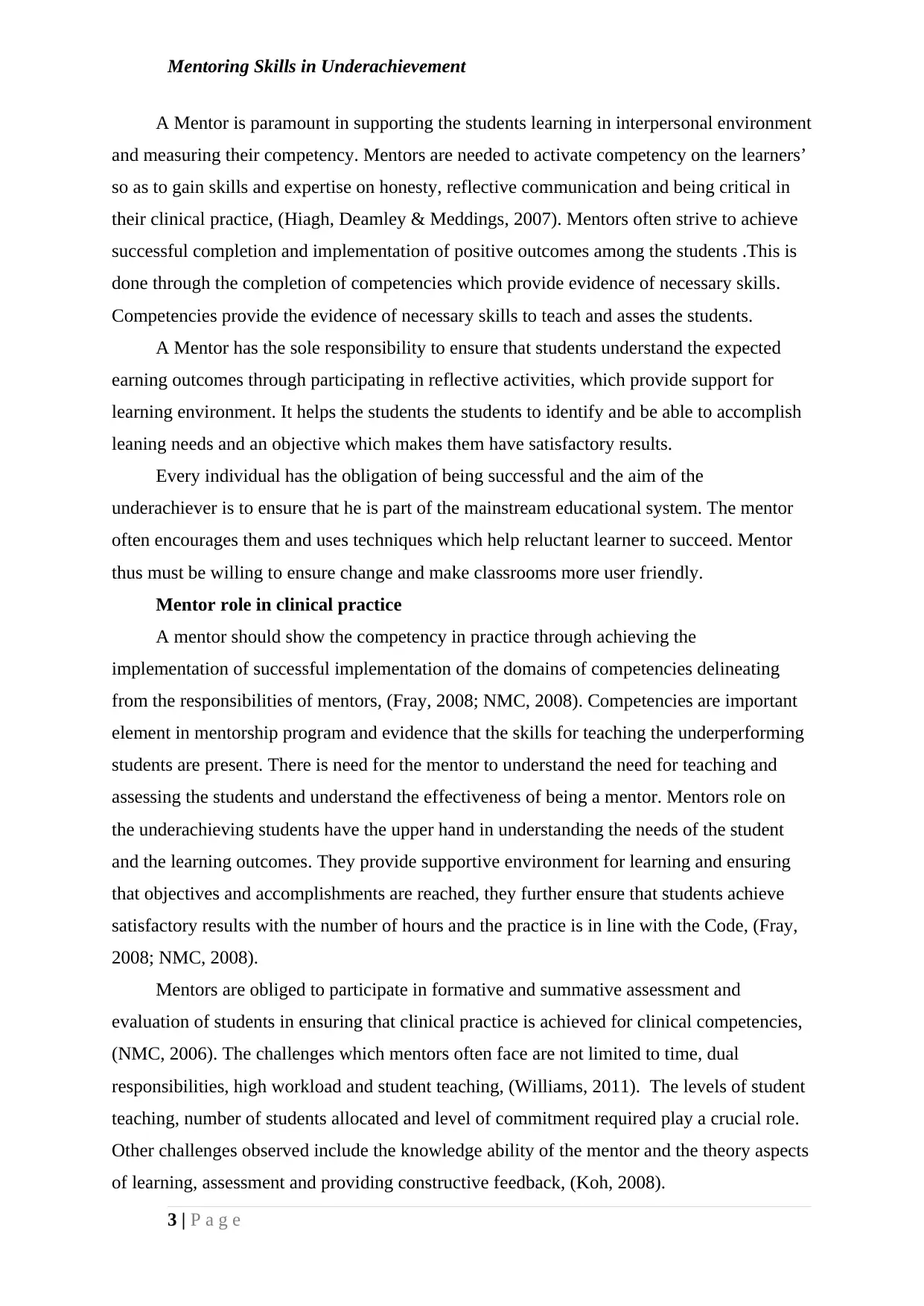
Mentoring Skills in Underachievement
A Mentor is paramount in supporting the students learning in interpersonal environment
and measuring their competency. Mentors are needed to activate competency on the learners’
so as to gain skills and expertise on honesty, reflective communication and being critical in
their clinical practice, (Hiagh, Deamley & Meddings, 2007). Mentors often strive to achieve
successful completion and implementation of positive outcomes among the students .This is
done through the completion of competencies which provide evidence of necessary skills.
Competencies provide the evidence of necessary skills to teach and asses the students.
A Mentor has the sole responsibility to ensure that students understand the expected
earning outcomes through participating in reflective activities, which provide support for
learning environment. It helps the students the students to identify and be able to accomplish
leaning needs and an objective which makes them have satisfactory results.
Every individual has the obligation of being successful and the aim of the
underachiever is to ensure that he is part of the mainstream educational system. The mentor
often encourages them and uses techniques which help reluctant learner to succeed. Mentor
thus must be willing to ensure change and make classrooms more user friendly.
Mentor role in clinical practice
A mentor should show the competency in practice through achieving the
implementation of successful implementation of the domains of competencies delineating
from the responsibilities of mentors, (Fray, 2008; NMC, 2008). Competencies are important
element in mentorship program and evidence that the skills for teaching the underperforming
students are present. There is need for the mentor to understand the need for teaching and
assessing the students and understand the effectiveness of being a mentor. Mentors role on
the underachieving students have the upper hand in understanding the needs of the student
and the learning outcomes. They provide supportive environment for learning and ensuring
that objectives and accomplishments are reached, they further ensure that students achieve
satisfactory results with the number of hours and the practice is in line with the Code, (Fray,
2008; NMC, 2008).
Mentors are obliged to participate in formative and summative assessment and
evaluation of students in ensuring that clinical practice is achieved for clinical competencies,
(NMC, 2006). The challenges which mentors often face are not limited to time, dual
responsibilities, high workload and student teaching, (Williams, 2011). The levels of student
teaching, number of students allocated and level of commitment required play a crucial role.
Other challenges observed include the knowledge ability of the mentor and the theory aspects
of learning, assessment and providing constructive feedback, (Koh, 2008).
3 | P a g e
A Mentor is paramount in supporting the students learning in interpersonal environment
and measuring their competency. Mentors are needed to activate competency on the learners’
so as to gain skills and expertise on honesty, reflective communication and being critical in
their clinical practice, (Hiagh, Deamley & Meddings, 2007). Mentors often strive to achieve
successful completion and implementation of positive outcomes among the students .This is
done through the completion of competencies which provide evidence of necessary skills.
Competencies provide the evidence of necessary skills to teach and asses the students.
A Mentor has the sole responsibility to ensure that students understand the expected
earning outcomes through participating in reflective activities, which provide support for
learning environment. It helps the students the students to identify and be able to accomplish
leaning needs and an objective which makes them have satisfactory results.
Every individual has the obligation of being successful and the aim of the
underachiever is to ensure that he is part of the mainstream educational system. The mentor
often encourages them and uses techniques which help reluctant learner to succeed. Mentor
thus must be willing to ensure change and make classrooms more user friendly.
Mentor role in clinical practice
A mentor should show the competency in practice through achieving the
implementation of successful implementation of the domains of competencies delineating
from the responsibilities of mentors, (Fray, 2008; NMC, 2008). Competencies are important
element in mentorship program and evidence that the skills for teaching the underperforming
students are present. There is need for the mentor to understand the need for teaching and
assessing the students and understand the effectiveness of being a mentor. Mentors role on
the underachieving students have the upper hand in understanding the needs of the student
and the learning outcomes. They provide supportive environment for learning and ensuring
that objectives and accomplishments are reached, they further ensure that students achieve
satisfactory results with the number of hours and the practice is in line with the Code, (Fray,
2008; NMC, 2008).
Mentors are obliged to participate in formative and summative assessment and
evaluation of students in ensuring that clinical practice is achieved for clinical competencies,
(NMC, 2006). The challenges which mentors often face are not limited to time, dual
responsibilities, high workload and student teaching, (Williams, 2011). The levels of student
teaching, number of students allocated and level of commitment required play a crucial role.
Other challenges observed include the knowledge ability of the mentor and the theory aspects
of learning, assessment and providing constructive feedback, (Koh, 2008).
3 | P a g e
⊘ This is a preview!⊘
Do you want full access?
Subscribe today to unlock all pages.

Trusted by 1+ million students worldwide
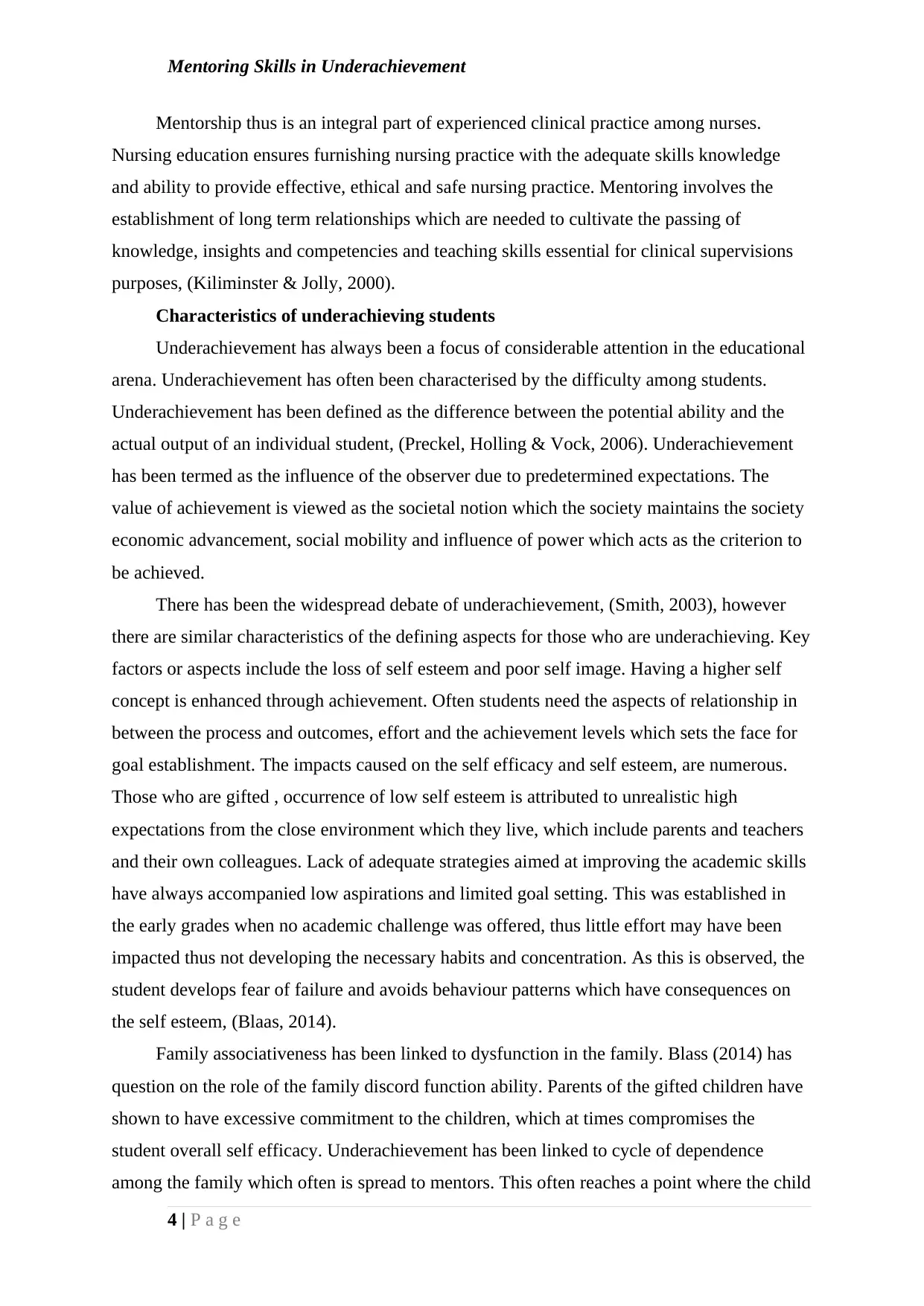
Mentoring Skills in Underachievement
Mentorship thus is an integral part of experienced clinical practice among nurses.
Nursing education ensures furnishing nursing practice with the adequate skills knowledge
and ability to provide effective, ethical and safe nursing practice. Mentoring involves the
establishment of long term relationships which are needed to cultivate the passing of
knowledge, insights and competencies and teaching skills essential for clinical supervisions
purposes, (Kiliminster & Jolly, 2000).
Characteristics of underachieving students
Underachievement has always been a focus of considerable attention in the educational
arena. Underachievement has often been characterised by the difficulty among students.
Underachievement has been defined as the difference between the potential ability and the
actual output of an individual student, (Preckel, Holling & Vock, 2006). Underachievement
has been termed as the influence of the observer due to predetermined expectations. The
value of achievement is viewed as the societal notion which the society maintains the society
economic advancement, social mobility and influence of power which acts as the criterion to
be achieved.
There has been the widespread debate of underachievement, (Smith, 2003), however
there are similar characteristics of the defining aspects for those who are underachieving. Key
factors or aspects include the loss of self esteem and poor self image. Having a higher self
concept is enhanced through achievement. Often students need the aspects of relationship in
between the process and outcomes, effort and the achievement levels which sets the face for
goal establishment. The impacts caused on the self efficacy and self esteem, are numerous.
Those who are gifted , occurrence of low self esteem is attributed to unrealistic high
expectations from the close environment which they live, which include parents and teachers
and their own colleagues. Lack of adequate strategies aimed at improving the academic skills
have always accompanied low aspirations and limited goal setting. This was established in
the early grades when no academic challenge was offered, thus little effort may have been
impacted thus not developing the necessary habits and concentration. As this is observed, the
student develops fear of failure and avoids behaviour patterns which have consequences on
the self esteem, (Blaas, 2014).
Family associativeness has been linked to dysfunction in the family. Blass (2014) has
question on the role of the family discord function ability. Parents of the gifted children have
shown to have excessive commitment to the children, which at times compromises the
student overall self efficacy. Underachievement has been linked to cycle of dependence
among the family which often is spread to mentors. This often reaches a point where the child
4 | P a g e
Mentorship thus is an integral part of experienced clinical practice among nurses.
Nursing education ensures furnishing nursing practice with the adequate skills knowledge
and ability to provide effective, ethical and safe nursing practice. Mentoring involves the
establishment of long term relationships which are needed to cultivate the passing of
knowledge, insights and competencies and teaching skills essential for clinical supervisions
purposes, (Kiliminster & Jolly, 2000).
Characteristics of underachieving students
Underachievement has always been a focus of considerable attention in the educational
arena. Underachievement has often been characterised by the difficulty among students.
Underachievement has been defined as the difference between the potential ability and the
actual output of an individual student, (Preckel, Holling & Vock, 2006). Underachievement
has been termed as the influence of the observer due to predetermined expectations. The
value of achievement is viewed as the societal notion which the society maintains the society
economic advancement, social mobility and influence of power which acts as the criterion to
be achieved.
There has been the widespread debate of underachievement, (Smith, 2003), however
there are similar characteristics of the defining aspects for those who are underachieving. Key
factors or aspects include the loss of self esteem and poor self image. Having a higher self
concept is enhanced through achievement. Often students need the aspects of relationship in
between the process and outcomes, effort and the achievement levels which sets the face for
goal establishment. The impacts caused on the self efficacy and self esteem, are numerous.
Those who are gifted , occurrence of low self esteem is attributed to unrealistic high
expectations from the close environment which they live, which include parents and teachers
and their own colleagues. Lack of adequate strategies aimed at improving the academic skills
have always accompanied low aspirations and limited goal setting. This was established in
the early grades when no academic challenge was offered, thus little effort may have been
impacted thus not developing the necessary habits and concentration. As this is observed, the
student develops fear of failure and avoids behaviour patterns which have consequences on
the self esteem, (Blaas, 2014).
Family associativeness has been linked to dysfunction in the family. Blass (2014) has
question on the role of the family discord function ability. Parents of the gifted children have
shown to have excessive commitment to the children, which at times compromises the
student overall self efficacy. Underachievement has been linked to cycle of dependence
among the family which often is spread to mentors. This often reaches a point where the child
4 | P a g e
Paraphrase This Document
Need a fresh take? Get an instant paraphrase of this document with our AI Paraphraser
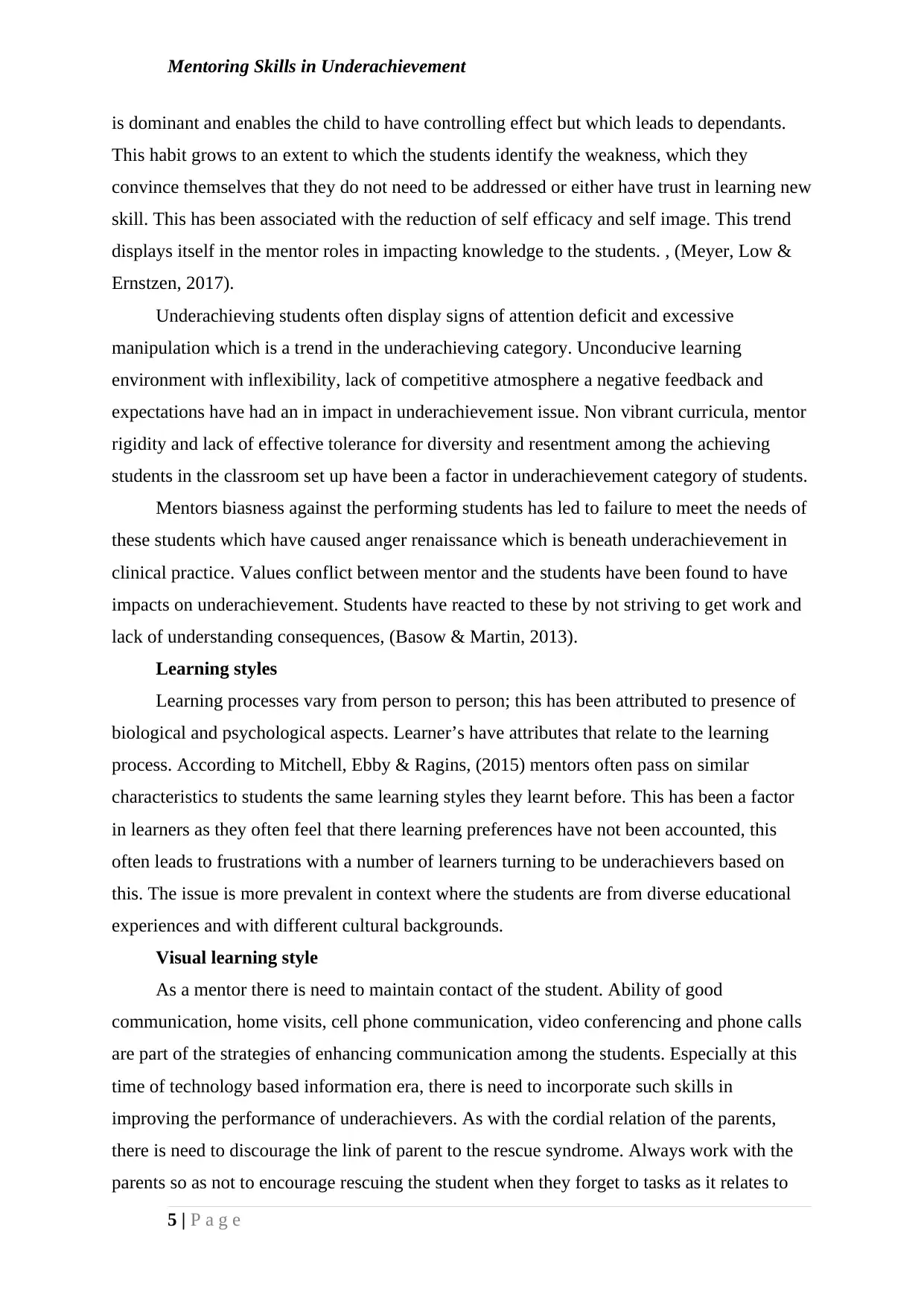
Mentoring Skills in Underachievement
is dominant and enables the child to have controlling effect but which leads to dependants.
This habit grows to an extent to which the students identify the weakness, which they
convince themselves that they do not need to be addressed or either have trust in learning new
skill. This has been associated with the reduction of self efficacy and self image. This trend
displays itself in the mentor roles in impacting knowledge to the students. , (Meyer, Low &
Ernstzen, 2017).
Underachieving students often display signs of attention deficit and excessive
manipulation which is a trend in the underachieving category. Unconducive learning
environment with inflexibility, lack of competitive atmosphere a negative feedback and
expectations have had an in impact in underachievement issue. Non vibrant curricula, mentor
rigidity and lack of effective tolerance for diversity and resentment among the achieving
students in the classroom set up have been a factor in underachievement category of students.
Mentors biasness against the performing students has led to failure to meet the needs of
these students which have caused anger renaissance which is beneath underachievement in
clinical practice. Values conflict between mentor and the students have been found to have
impacts on underachievement. Students have reacted to these by not striving to get work and
lack of understanding consequences, (Basow & Martin, 2013).
Learning styles
Learning processes vary from person to person; this has been attributed to presence of
biological and psychological aspects. Learner’s have attributes that relate to the learning
process. According to Mitchell, Ebby & Ragins, (2015) mentors often pass on similar
characteristics to students the same learning styles they learnt before. This has been a factor
in learners as they often feel that there learning preferences have not been accounted, this
often leads to frustrations with a number of learners turning to be underachievers based on
this. The issue is more prevalent in context where the students are from diverse educational
experiences and with different cultural backgrounds.
Visual learning style
As a mentor there is need to maintain contact of the student. Ability of good
communication, home visits, cell phone communication, video conferencing and phone calls
are part of the strategies of enhancing communication among the students. Especially at this
time of technology based information era, there is need to incorporate such skills in
improving the performance of underachievers. As with the cordial relation of the parents,
there is need to discourage the link of parent to the rescue syndrome. Always work with the
parents so as not to encourage rescuing the student when they forget to tasks as it relates to
5 | P a g e
is dominant and enables the child to have controlling effect but which leads to dependants.
This habit grows to an extent to which the students identify the weakness, which they
convince themselves that they do not need to be addressed or either have trust in learning new
skill. This has been associated with the reduction of self efficacy and self image. This trend
displays itself in the mentor roles in impacting knowledge to the students. , (Meyer, Low &
Ernstzen, 2017).
Underachieving students often display signs of attention deficit and excessive
manipulation which is a trend in the underachieving category. Unconducive learning
environment with inflexibility, lack of competitive atmosphere a negative feedback and
expectations have had an in impact in underachievement issue. Non vibrant curricula, mentor
rigidity and lack of effective tolerance for diversity and resentment among the achieving
students in the classroom set up have been a factor in underachievement category of students.
Mentors biasness against the performing students has led to failure to meet the needs of
these students which have caused anger renaissance which is beneath underachievement in
clinical practice. Values conflict between mentor and the students have been found to have
impacts on underachievement. Students have reacted to these by not striving to get work and
lack of understanding consequences, (Basow & Martin, 2013).
Learning styles
Learning processes vary from person to person; this has been attributed to presence of
biological and psychological aspects. Learner’s have attributes that relate to the learning
process. According to Mitchell, Ebby & Ragins, (2015) mentors often pass on similar
characteristics to students the same learning styles they learnt before. This has been a factor
in learners as they often feel that there learning preferences have not been accounted, this
often leads to frustrations with a number of learners turning to be underachievers based on
this. The issue is more prevalent in context where the students are from diverse educational
experiences and with different cultural backgrounds.
Visual learning style
As a mentor there is need to maintain contact of the student. Ability of good
communication, home visits, cell phone communication, video conferencing and phone calls
are part of the strategies of enhancing communication among the students. Especially at this
time of technology based information era, there is need to incorporate such skills in
improving the performance of underachievers. As with the cordial relation of the parents,
there is need to discourage the link of parent to the rescue syndrome. Always work with the
parents so as not to encourage rescuing the student when they forget to tasks as it relates to
5 | P a g e
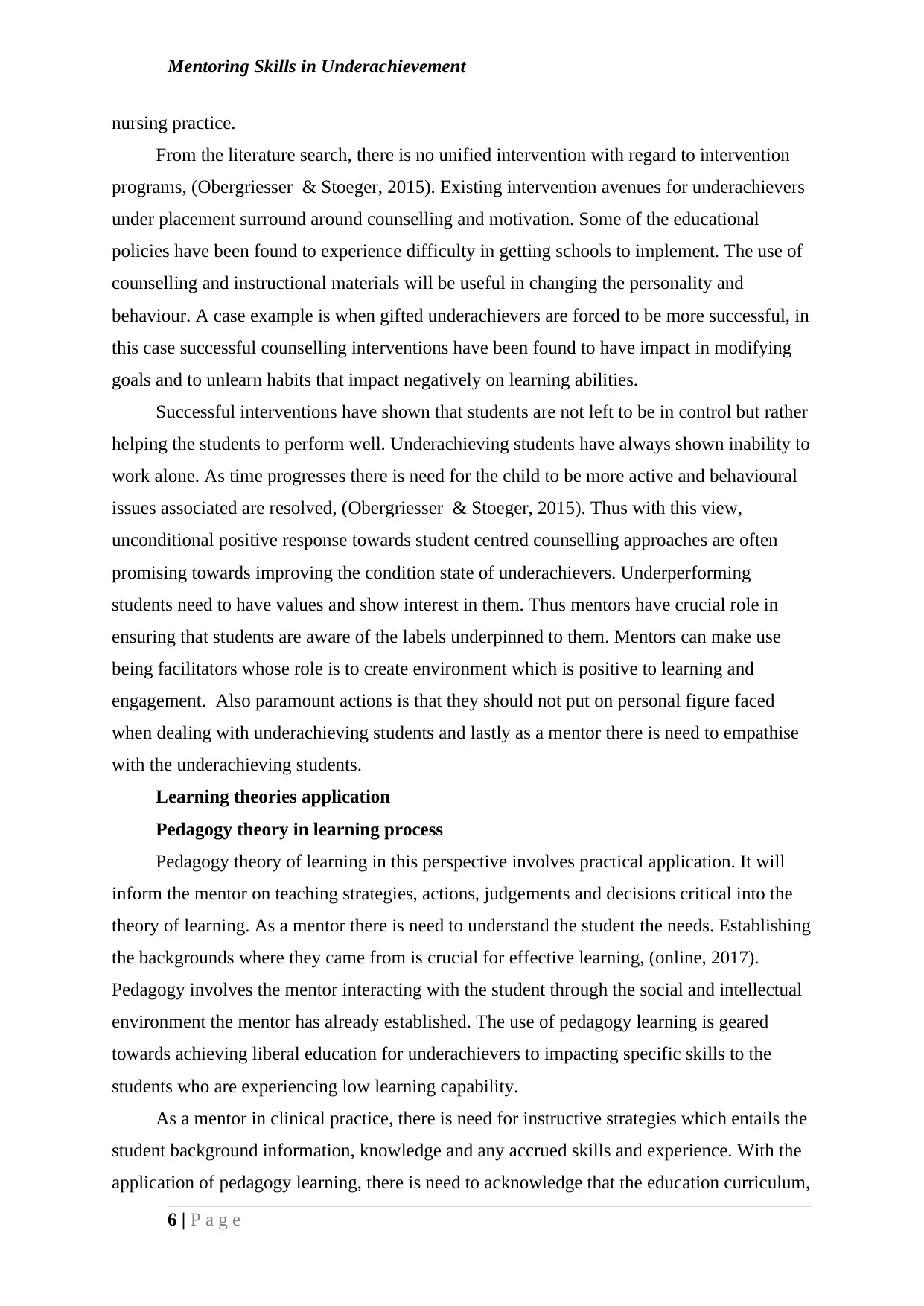
Mentoring Skills in Underachievement
nursing practice.
From the literature search, there is no unified intervention with regard to intervention
programs, (Obergriesser & Stoeger, 2015). Existing intervention avenues for underachievers
under placement surround around counselling and motivation. Some of the educational
policies have been found to experience difficulty in getting schools to implement. The use of
counselling and instructional materials will be useful in changing the personality and
behaviour. A case example is when gifted underachievers are forced to be more successful, in
this case successful counselling interventions have been found to have impact in modifying
goals and to unlearn habits that impact negatively on learning abilities.
Successful interventions have shown that students are not left to be in control but rather
helping the students to perform well. Underachieving students have always shown inability to
work alone. As time progresses there is need for the child to be more active and behavioural
issues associated are resolved, (Obergriesser & Stoeger, 2015). Thus with this view,
unconditional positive response towards student centred counselling approaches are often
promising towards improving the condition state of underachievers. Underperforming
students need to have values and show interest in them. Thus mentors have crucial role in
ensuring that students are aware of the labels underpinned to them. Mentors can make use
being facilitators whose role is to create environment which is positive to learning and
engagement. Also paramount actions is that they should not put on personal figure faced
when dealing with underachieving students and lastly as a mentor there is need to empathise
with the underachieving students.
Learning theories application
Pedagogy theory in learning process
Pedagogy theory of learning in this perspective involves practical application. It will
inform the mentor on teaching strategies, actions, judgements and decisions critical into the
theory of learning. As a mentor there is need to understand the student the needs. Establishing
the backgrounds where they came from is crucial for effective learning, (online, 2017).
Pedagogy involves the mentor interacting with the student through the social and intellectual
environment the mentor has already established. The use of pedagogy learning is geared
towards achieving liberal education for underachievers to impacting specific skills to the
students who are experiencing low learning capability.
As a mentor in clinical practice, there is need for instructive strategies which entails the
student background information, knowledge and any accrued skills and experience. With the
application of pedagogy learning, there is need to acknowledge that the education curriculum,
6 | P a g e
nursing practice.
From the literature search, there is no unified intervention with regard to intervention
programs, (Obergriesser & Stoeger, 2015). Existing intervention avenues for underachievers
under placement surround around counselling and motivation. Some of the educational
policies have been found to experience difficulty in getting schools to implement. The use of
counselling and instructional materials will be useful in changing the personality and
behaviour. A case example is when gifted underachievers are forced to be more successful, in
this case successful counselling interventions have been found to have impact in modifying
goals and to unlearn habits that impact negatively on learning abilities.
Successful interventions have shown that students are not left to be in control but rather
helping the students to perform well. Underachieving students have always shown inability to
work alone. As time progresses there is need for the child to be more active and behavioural
issues associated are resolved, (Obergriesser & Stoeger, 2015). Thus with this view,
unconditional positive response towards student centred counselling approaches are often
promising towards improving the condition state of underachievers. Underperforming
students need to have values and show interest in them. Thus mentors have crucial role in
ensuring that students are aware of the labels underpinned to them. Mentors can make use
being facilitators whose role is to create environment which is positive to learning and
engagement. Also paramount actions is that they should not put on personal figure faced
when dealing with underachieving students and lastly as a mentor there is need to empathise
with the underachieving students.
Learning theories application
Pedagogy theory in learning process
Pedagogy theory of learning in this perspective involves practical application. It will
inform the mentor on teaching strategies, actions, judgements and decisions critical into the
theory of learning. As a mentor there is need to understand the student the needs. Establishing
the backgrounds where they came from is crucial for effective learning, (online, 2017).
Pedagogy involves the mentor interacting with the student through the social and intellectual
environment the mentor has already established. The use of pedagogy learning is geared
towards achieving liberal education for underachievers to impacting specific skills to the
students who are experiencing low learning capability.
As a mentor in clinical practice, there is need for instructive strategies which entails the
student background information, knowledge and any accrued skills and experience. With the
application of pedagogy learning, there is need to acknowledge that the education curriculum,
6 | P a g e
⊘ This is a preview!⊘
Do you want full access?
Subscribe today to unlock all pages.

Trusted by 1+ million students worldwide
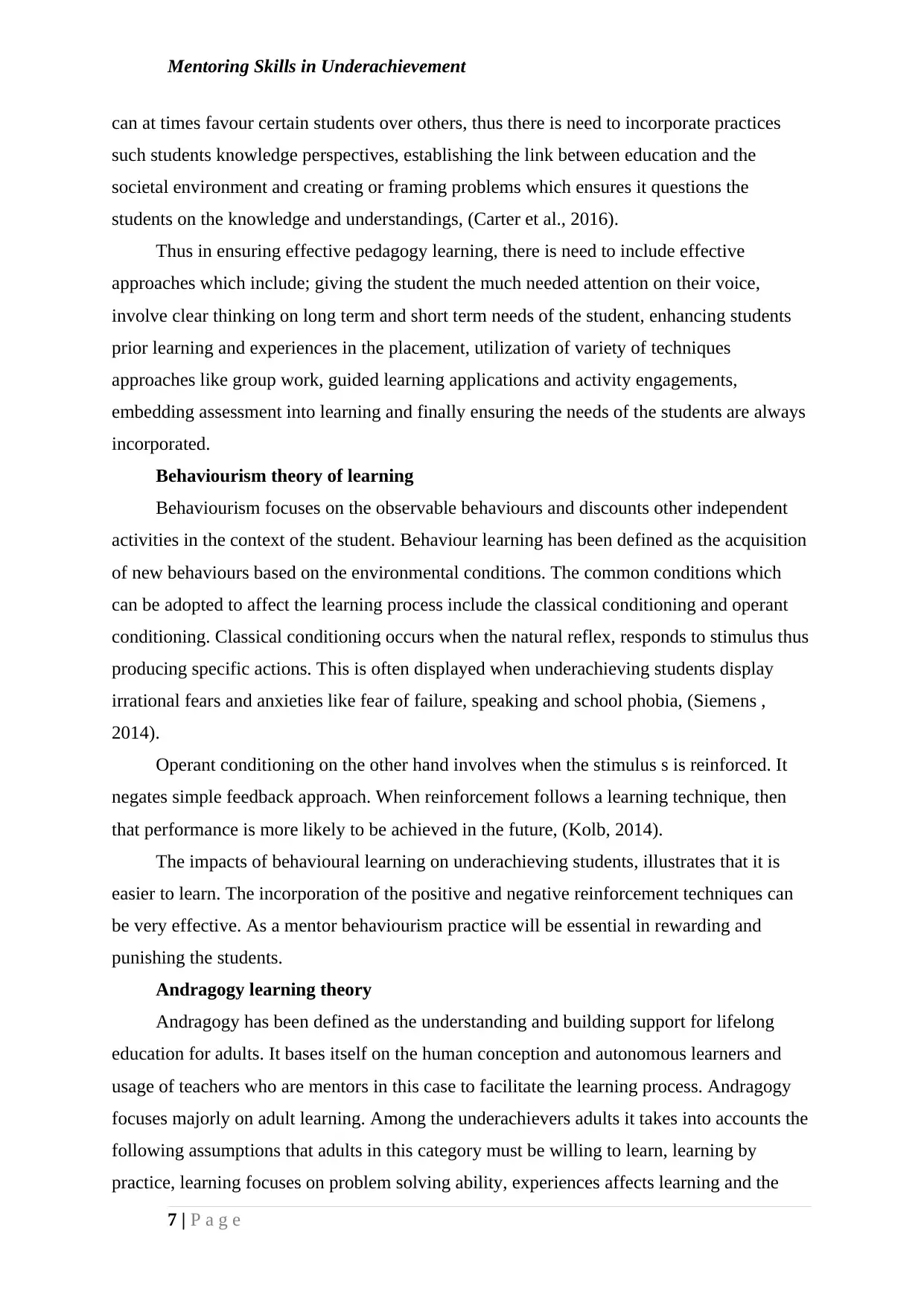
Mentoring Skills in Underachievement
can at times favour certain students over others, thus there is need to incorporate practices
such students knowledge perspectives, establishing the link between education and the
societal environment and creating or framing problems which ensures it questions the
students on the knowledge and understandings, (Carter et al., 2016).
Thus in ensuring effective pedagogy learning, there is need to include effective
approaches which include; giving the student the much needed attention on their voice,
involve clear thinking on long term and short term needs of the student, enhancing students
prior learning and experiences in the placement, utilization of variety of techniques
approaches like group work, guided learning applications and activity engagements,
embedding assessment into learning and finally ensuring the needs of the students are always
incorporated.
Behaviourism theory of learning
Behaviourism focuses on the observable behaviours and discounts other independent
activities in the context of the student. Behaviour learning has been defined as the acquisition
of new behaviours based on the environmental conditions. The common conditions which
can be adopted to affect the learning process include the classical conditioning and operant
conditioning. Classical conditioning occurs when the natural reflex, responds to stimulus thus
producing specific actions. This is often displayed when underachieving students display
irrational fears and anxieties like fear of failure, speaking and school phobia, (Siemens ,
2014).
Operant conditioning on the other hand involves when the stimulus s is reinforced. It
negates simple feedback approach. When reinforcement follows a learning technique, then
that performance is more likely to be achieved in the future, (Kolb, 2014).
The impacts of behavioural learning on underachieving students, illustrates that it is
easier to learn. The incorporation of the positive and negative reinforcement techniques can
be very effective. As a mentor behaviourism practice will be essential in rewarding and
punishing the students.
Andragogy learning theory
Andragogy has been defined as the understanding and building support for lifelong
education for adults. It bases itself on the human conception and autonomous learners and
usage of teachers who are mentors in this case to facilitate the learning process. Andragogy
focuses majorly on adult learning. Among the underachievers adults it takes into accounts the
following assumptions that adults in this category must be willing to learn, learning by
practice, learning focuses on problem solving ability, experiences affects learning and the
7 | P a g e
can at times favour certain students over others, thus there is need to incorporate practices
such students knowledge perspectives, establishing the link between education and the
societal environment and creating or framing problems which ensures it questions the
students on the knowledge and understandings, (Carter et al., 2016).
Thus in ensuring effective pedagogy learning, there is need to include effective
approaches which include; giving the student the much needed attention on their voice,
involve clear thinking on long term and short term needs of the student, enhancing students
prior learning and experiences in the placement, utilization of variety of techniques
approaches like group work, guided learning applications and activity engagements,
embedding assessment into learning and finally ensuring the needs of the students are always
incorporated.
Behaviourism theory of learning
Behaviourism focuses on the observable behaviours and discounts other independent
activities in the context of the student. Behaviour learning has been defined as the acquisition
of new behaviours based on the environmental conditions. The common conditions which
can be adopted to affect the learning process include the classical conditioning and operant
conditioning. Classical conditioning occurs when the natural reflex, responds to stimulus thus
producing specific actions. This is often displayed when underachieving students display
irrational fears and anxieties like fear of failure, speaking and school phobia, (Siemens ,
2014).
Operant conditioning on the other hand involves when the stimulus s is reinforced. It
negates simple feedback approach. When reinforcement follows a learning technique, then
that performance is more likely to be achieved in the future, (Kolb, 2014).
The impacts of behavioural learning on underachieving students, illustrates that it is
easier to learn. The incorporation of the positive and negative reinforcement techniques can
be very effective. As a mentor behaviourism practice will be essential in rewarding and
punishing the students.
Andragogy learning theory
Andragogy has been defined as the understanding and building support for lifelong
education for adults. It bases itself on the human conception and autonomous learners and
usage of teachers who are mentors in this case to facilitate the learning process. Andragogy
focuses majorly on adult learning. Among the underachievers adults it takes into accounts the
following assumptions that adults in this category must be willing to learn, learning by
practice, learning focuses on problem solving ability, experiences affects learning and the
7 | P a g e
Paraphrase This Document
Need a fresh take? Get an instant paraphrase of this document with our AI Paraphraser
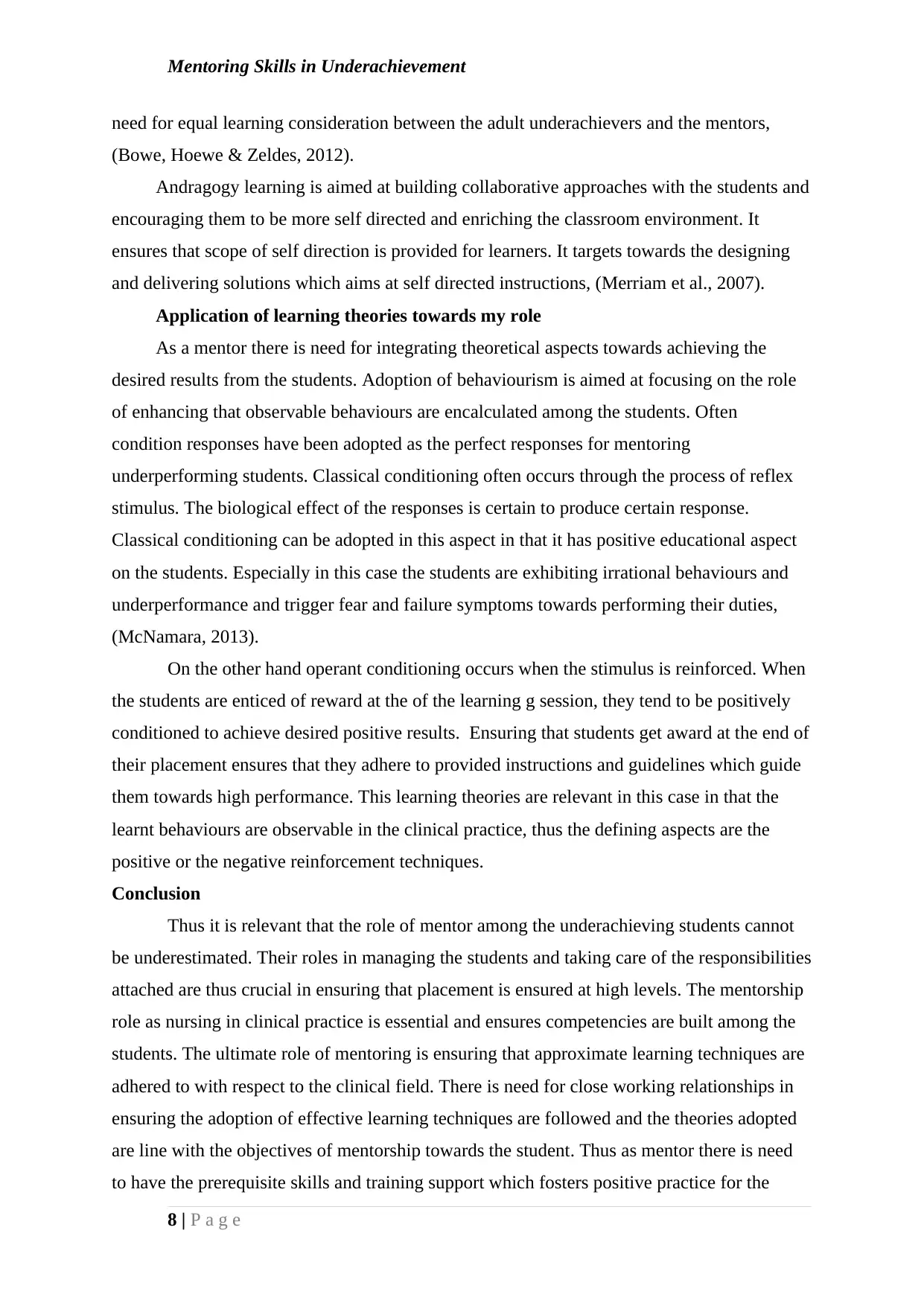
Mentoring Skills in Underachievement
need for equal learning consideration between the adult underachievers and the mentors,
(Bowe, Hoewe & Zeldes, 2012).
Andragogy learning is aimed at building collaborative approaches with the students and
encouraging them to be more self directed and enriching the classroom environment. It
ensures that scope of self direction is provided for learners. It targets towards the designing
and delivering solutions which aims at self directed instructions, (Merriam et al., 2007).
Application of learning theories towards my role
As a mentor there is need for integrating theoretical aspects towards achieving the
desired results from the students. Adoption of behaviourism is aimed at focusing on the role
of enhancing that observable behaviours are encalculated among the students. Often
condition responses have been adopted as the perfect responses for mentoring
underperforming students. Classical conditioning often occurs through the process of reflex
stimulus. The biological effect of the responses is certain to produce certain response.
Classical conditioning can be adopted in this aspect in that it has positive educational aspect
on the students. Especially in this case the students are exhibiting irrational behaviours and
underperformance and trigger fear and failure symptoms towards performing their duties,
(McNamara, 2013).
On the other hand operant conditioning occurs when the stimulus is reinforced. When
the students are enticed of reward at the of the learning g session, they tend to be positively
conditioned to achieve desired positive results. Ensuring that students get award at the end of
their placement ensures that they adhere to provided instructions and guidelines which guide
them towards high performance. This learning theories are relevant in this case in that the
learnt behaviours are observable in the clinical practice, thus the defining aspects are the
positive or the negative reinforcement techniques.
Conclusion
Thus it is relevant that the role of mentor among the underachieving students cannot
be underestimated. Their roles in managing the students and taking care of the responsibilities
attached are thus crucial in ensuring that placement is ensured at high levels. The mentorship
role as nursing in clinical practice is essential and ensures competencies are built among the
students. The ultimate role of mentoring is ensuring that approximate learning techniques are
adhered to with respect to the clinical field. There is need for close working relationships in
ensuring the adoption of effective learning techniques are followed and the theories adopted
are line with the objectives of mentorship towards the student. Thus as mentor there is need
to have the prerequisite skills and training support which fosters positive practice for the
8 | P a g e
need for equal learning consideration between the adult underachievers and the mentors,
(Bowe, Hoewe & Zeldes, 2012).
Andragogy learning is aimed at building collaborative approaches with the students and
encouraging them to be more self directed and enriching the classroom environment. It
ensures that scope of self direction is provided for learners. It targets towards the designing
and delivering solutions which aims at self directed instructions, (Merriam et al., 2007).
Application of learning theories towards my role
As a mentor there is need for integrating theoretical aspects towards achieving the
desired results from the students. Adoption of behaviourism is aimed at focusing on the role
of enhancing that observable behaviours are encalculated among the students. Often
condition responses have been adopted as the perfect responses for mentoring
underperforming students. Classical conditioning often occurs through the process of reflex
stimulus. The biological effect of the responses is certain to produce certain response.
Classical conditioning can be adopted in this aspect in that it has positive educational aspect
on the students. Especially in this case the students are exhibiting irrational behaviours and
underperformance and trigger fear and failure symptoms towards performing their duties,
(McNamara, 2013).
On the other hand operant conditioning occurs when the stimulus is reinforced. When
the students are enticed of reward at the of the learning g session, they tend to be positively
conditioned to achieve desired positive results. Ensuring that students get award at the end of
their placement ensures that they adhere to provided instructions and guidelines which guide
them towards high performance. This learning theories are relevant in this case in that the
learnt behaviours are observable in the clinical practice, thus the defining aspects are the
positive or the negative reinforcement techniques.
Conclusion
Thus it is relevant that the role of mentor among the underachieving students cannot
be underestimated. Their roles in managing the students and taking care of the responsibilities
attached are thus crucial in ensuring that placement is ensured at high levels. The mentorship
role as nursing in clinical practice is essential and ensures competencies are built among the
students. The ultimate role of mentoring is ensuring that approximate learning techniques are
adhered to with respect to the clinical field. There is need for close working relationships in
ensuring the adoption of effective learning techniques are followed and the theories adopted
are line with the objectives of mentorship towards the student. Thus as mentor there is need
to have the prerequisite skills and training support which fosters positive practice for the
8 | P a g e
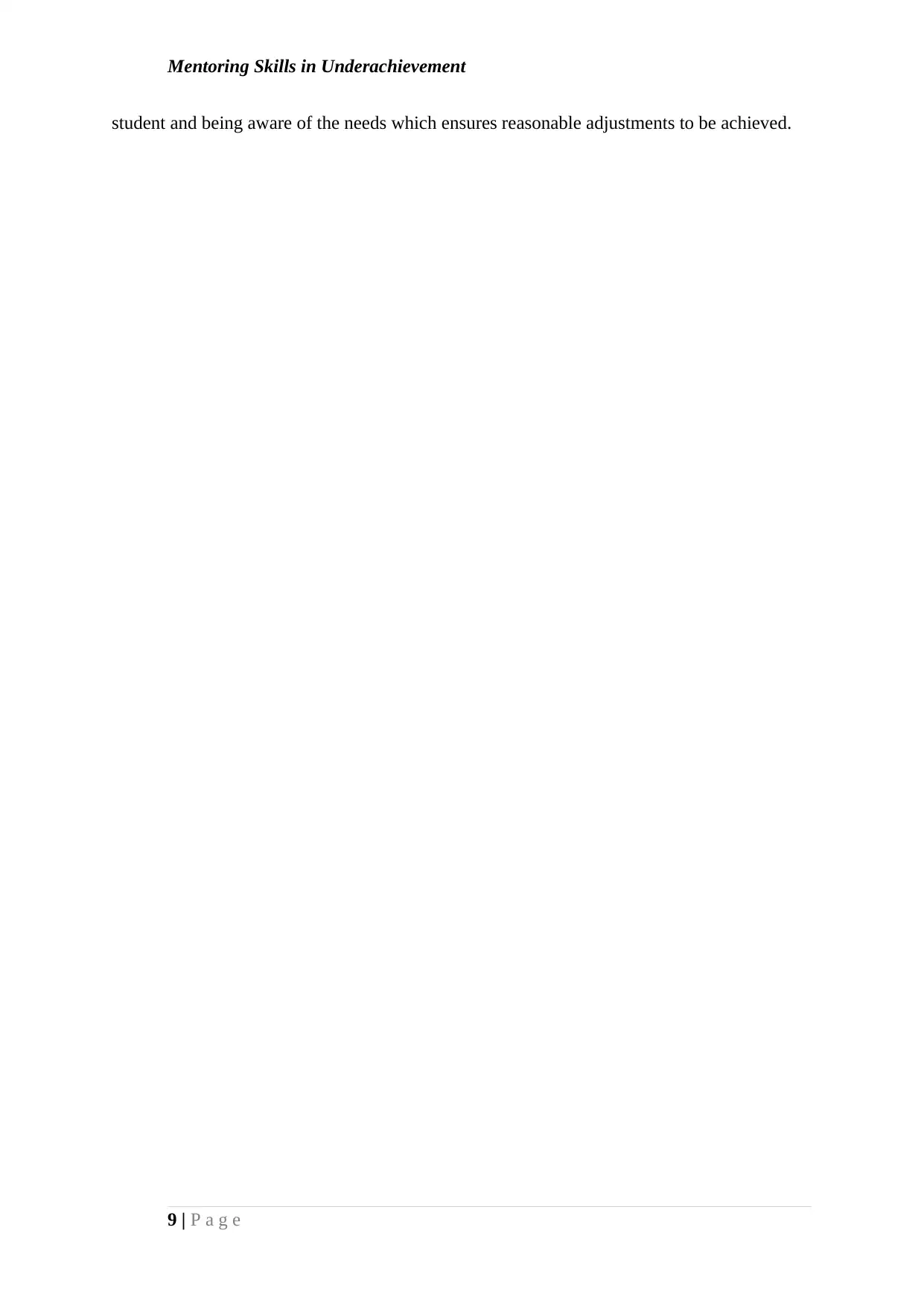
Mentoring Skills in Underachievement
student and being aware of the needs which ensures reasonable adjustments to be achieved.
9 | P a g e
student and being aware of the needs which ensures reasonable adjustments to be achieved.
9 | P a g e
⊘ This is a preview!⊘
Do you want full access?
Subscribe today to unlock all pages.

Trusted by 1+ million students worldwide
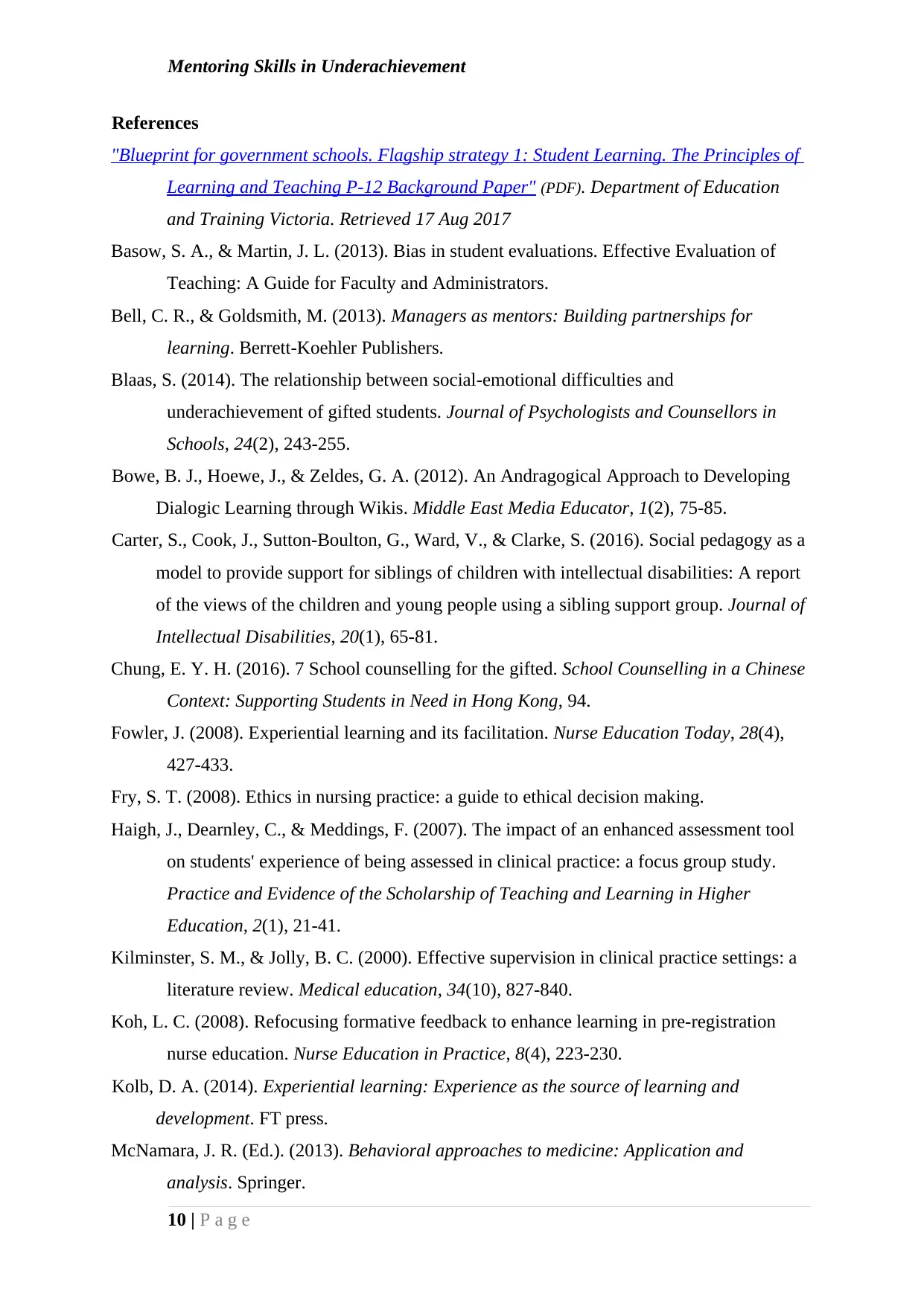
Mentoring Skills in Underachievement
References
"Blueprint for government schools. Flagship strategy 1: Student Learning. The Principles of
Learning and Teaching P-12 Background Paper" (PDF). Department of Education
and Training Victoria. Retrieved 17 Aug 2017
Basow, S. A., & Martin, J. L. (2013). Bias in student evaluations. Effective Evaluation of
Teaching: A Guide for Faculty and Administrators.
Bell, C. R., & Goldsmith, M. (2013). Managers as mentors: Building partnerships for
learning. Berrett-Koehler Publishers.
Blaas, S. (2014). The relationship between social-emotional difficulties and
underachievement of gifted students. Journal of Psychologists and Counsellors in
Schools, 24(2), 243-255.
Bowe, B. J., Hoewe, J., & Zeldes, G. A. (2012). An Andragogical Approach to Developing
Dialogic Learning through Wikis. Middle East Media Educator, 1(2), 75-85.
Carter, S., Cook, J., Sutton-Boulton, G., Ward, V., & Clarke, S. (2016). Social pedagogy as a
model to provide support for siblings of children with intellectual disabilities: A report
of the views of the children and young people using a sibling support group. Journal of
Intellectual Disabilities, 20(1), 65-81.
Chung, E. Y. H. (2016). 7 School counselling for the gifted. School Counselling in a Chinese
Context: Supporting Students in Need in Hong Kong, 94.
Fowler, J. (2008). Experiential learning and its facilitation. Nurse Education Today, 28(4),
427-433.
Fry, S. T. (2008). Ethics in nursing practice: a guide to ethical decision making.
Haigh, J., Dearnley, C., & Meddings, F. (2007). The impact of an enhanced assessment tool
on students' experience of being assessed in clinical practice: a focus group study.
Practice and Evidence of the Scholarship of Teaching and Learning in Higher
Education, 2(1), 21-41.
Kilminster, S. M., & Jolly, B. C. (2000). Effective supervision in clinical practice settings: a
literature review. Medical education, 34(10), 827-840.
Koh, L. C. (2008). Refocusing formative feedback to enhance learning in pre-registration
nurse education. Nurse Education in Practice, 8(4), 223-230.
Kolb, D. A. (2014). Experiential learning: Experience as the source of learning and
development. FT press.
McNamara, J. R. (Ed.). (2013). Behavioral approaches to medicine: Application and
analysis. Springer.
10 | P a g e
References
"Blueprint for government schools. Flagship strategy 1: Student Learning. The Principles of
Learning and Teaching P-12 Background Paper" (PDF). Department of Education
and Training Victoria. Retrieved 17 Aug 2017
Basow, S. A., & Martin, J. L. (2013). Bias in student evaluations. Effective Evaluation of
Teaching: A Guide for Faculty and Administrators.
Bell, C. R., & Goldsmith, M. (2013). Managers as mentors: Building partnerships for
learning. Berrett-Koehler Publishers.
Blaas, S. (2014). The relationship between social-emotional difficulties and
underachievement of gifted students. Journal of Psychologists and Counsellors in
Schools, 24(2), 243-255.
Bowe, B. J., Hoewe, J., & Zeldes, G. A. (2012). An Andragogical Approach to Developing
Dialogic Learning through Wikis. Middle East Media Educator, 1(2), 75-85.
Carter, S., Cook, J., Sutton-Boulton, G., Ward, V., & Clarke, S. (2016). Social pedagogy as a
model to provide support for siblings of children with intellectual disabilities: A report
of the views of the children and young people using a sibling support group. Journal of
Intellectual Disabilities, 20(1), 65-81.
Chung, E. Y. H. (2016). 7 School counselling for the gifted. School Counselling in a Chinese
Context: Supporting Students in Need in Hong Kong, 94.
Fowler, J. (2008). Experiential learning and its facilitation. Nurse Education Today, 28(4),
427-433.
Fry, S. T. (2008). Ethics in nursing practice: a guide to ethical decision making.
Haigh, J., Dearnley, C., & Meddings, F. (2007). The impact of an enhanced assessment tool
on students' experience of being assessed in clinical practice: a focus group study.
Practice and Evidence of the Scholarship of Teaching and Learning in Higher
Education, 2(1), 21-41.
Kilminster, S. M., & Jolly, B. C. (2000). Effective supervision in clinical practice settings: a
literature review. Medical education, 34(10), 827-840.
Koh, L. C. (2008). Refocusing formative feedback to enhance learning in pre-registration
nurse education. Nurse Education in Practice, 8(4), 223-230.
Kolb, D. A. (2014). Experiential learning: Experience as the source of learning and
development. FT press.
McNamara, J. R. (Ed.). (2013). Behavioral approaches to medicine: Application and
analysis. Springer.
10 | P a g e
Paraphrase This Document
Need a fresh take? Get an instant paraphrase of this document with our AI Paraphraser
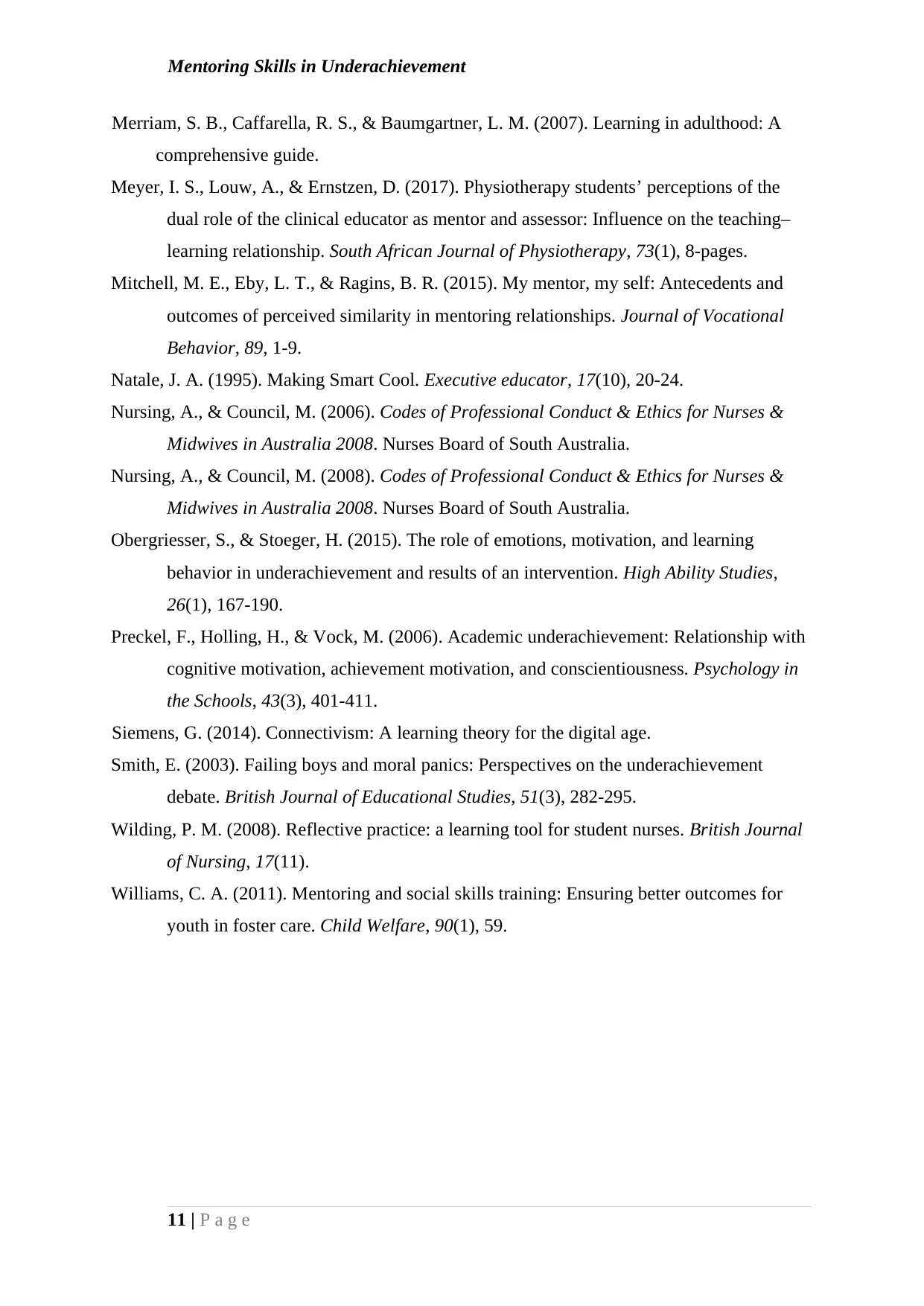
Mentoring Skills in Underachievement
Merriam, S. B., Caffarella, R. S., & Baumgartner, L. M. (2007). Learning in adulthood: A
comprehensive guide.
Meyer, I. S., Louw, A., & Ernstzen, D. (2017). Physiotherapy students’ perceptions of the
dual role of the clinical educator as mentor and assessor: Influence on the teaching–
learning relationship. South African Journal of Physiotherapy, 73(1), 8-pages.
Mitchell, M. E., Eby, L. T., & Ragins, B. R. (2015). My mentor, my self: Antecedents and
outcomes of perceived similarity in mentoring relationships. Journal of Vocational
Behavior, 89, 1-9.
Natale, J. A. (1995). Making Smart Cool. Executive educator, 17(10), 20-24.
Nursing, A., & Council, M. (2006). Codes of Professional Conduct & Ethics for Nurses &
Midwives in Australia 2008. Nurses Board of South Australia.
Nursing, A., & Council, M. (2008). Codes of Professional Conduct & Ethics for Nurses &
Midwives in Australia 2008. Nurses Board of South Australia.
Obergriesser, S., & Stoeger, H. (2015). The role of emotions, motivation, and learning
behavior in underachievement and results of an intervention. High Ability Studies,
26(1), 167-190.
Preckel, F., Holling, H., & Vock, M. (2006). Academic underachievement: Relationship with
cognitive motivation, achievement motivation, and conscientiousness. Psychology in
the Schools, 43(3), 401-411.
Siemens, G. (2014). Connectivism: A learning theory for the digital age.
Smith, E. (2003). Failing boys and moral panics: Perspectives on the underachievement
debate. British Journal of Educational Studies, 51(3), 282-295.
Wilding, P. M. (2008). Reflective practice: a learning tool for student nurses. British Journal
of Nursing, 17(11).
Williams, C. A. (2011). Mentoring and social skills training: Ensuring better outcomes for
youth in foster care. Child Welfare, 90(1), 59.
11 | P a g e
Merriam, S. B., Caffarella, R. S., & Baumgartner, L. M. (2007). Learning in adulthood: A
comprehensive guide.
Meyer, I. S., Louw, A., & Ernstzen, D. (2017). Physiotherapy students’ perceptions of the
dual role of the clinical educator as mentor and assessor: Influence on the teaching–
learning relationship. South African Journal of Physiotherapy, 73(1), 8-pages.
Mitchell, M. E., Eby, L. T., & Ragins, B. R. (2015). My mentor, my self: Antecedents and
outcomes of perceived similarity in mentoring relationships. Journal of Vocational
Behavior, 89, 1-9.
Natale, J. A. (1995). Making Smart Cool. Executive educator, 17(10), 20-24.
Nursing, A., & Council, M. (2006). Codes of Professional Conduct & Ethics for Nurses &
Midwives in Australia 2008. Nurses Board of South Australia.
Nursing, A., & Council, M. (2008). Codes of Professional Conduct & Ethics for Nurses &
Midwives in Australia 2008. Nurses Board of South Australia.
Obergriesser, S., & Stoeger, H. (2015). The role of emotions, motivation, and learning
behavior in underachievement and results of an intervention. High Ability Studies,
26(1), 167-190.
Preckel, F., Holling, H., & Vock, M. (2006). Academic underachievement: Relationship with
cognitive motivation, achievement motivation, and conscientiousness. Psychology in
the Schools, 43(3), 401-411.
Siemens, G. (2014). Connectivism: A learning theory for the digital age.
Smith, E. (2003). Failing boys and moral panics: Perspectives on the underachievement
debate. British Journal of Educational Studies, 51(3), 282-295.
Wilding, P. M. (2008). Reflective practice: a learning tool for student nurses. British Journal
of Nursing, 17(11).
Williams, C. A. (2011). Mentoring and social skills training: Ensuring better outcomes for
youth in foster care. Child Welfare, 90(1), 59.
11 | P a g e
1 out of 11
Related Documents
Your All-in-One AI-Powered Toolkit for Academic Success.
+13062052269
info@desklib.com
Available 24*7 on WhatsApp / Email
![[object Object]](/_next/static/media/star-bottom.7253800d.svg)
Unlock your academic potential
Copyright © 2020–2026 A2Z Services. All Rights Reserved. Developed and managed by ZUCOL.





